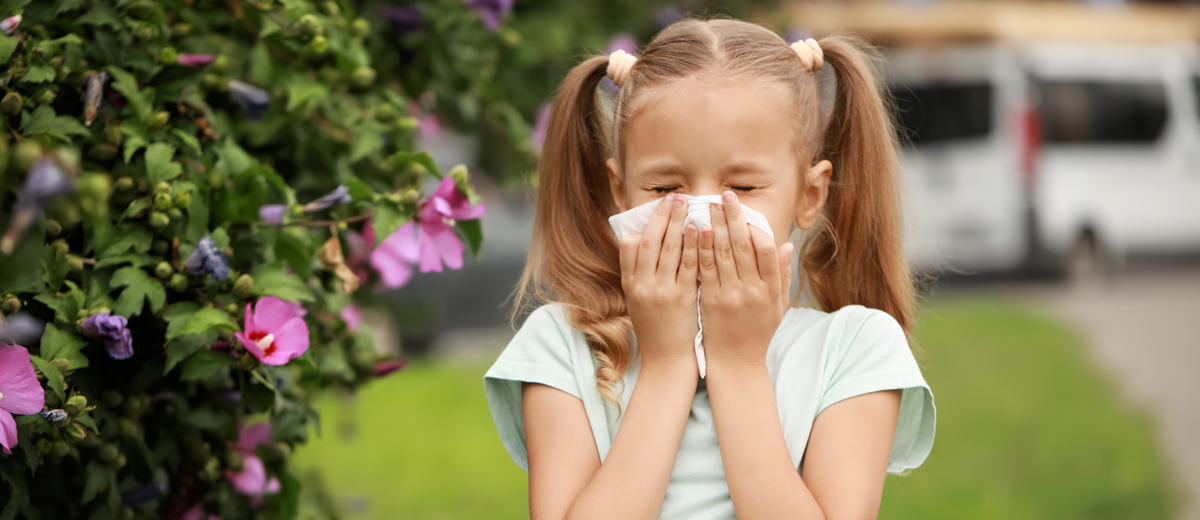The spring season brings delights of warmer weather, flowers blooming and the onset of numerous outdoor sports and activities. Unfortunately, for many, it can also bring sneezing, itchy eyes, runny nose, congestion, coughing and sinus pressure. While mild symptoms may just be an annoyance, severe pollen allergies can lead to frequent sick days, poor sleep, difficulty concentrating, asthma exacerbations and an increase in ear and sinus infections. Every year, seasonal allergies contribute to 2,000,000 school absences and have a significant impact on student’s academic, physical, social and emotional health.
According to the American College of Allergy, Asthma and Immunology (ACAAI), seasonal allergies may affect up to 40 percent of children and 30 percent of adults. Seasonal allergies, hay fever or allergic rhinitis, regardless of what you call it, the symptoms can be miserable. School nurses play an important role in helping to keep kids who suffer from seasonal allergies thriving in school, despite the pollen counts. Carefully discerning allergy symptoms from other viruses, including COVID, has added an additional layer of responsibility to school health offices and can lead to tumult and frustration amongst families and school staff. Educating the school community on symptom recognition, avoiding triggers and appropriate treatment options can keep kids blooming with health right alongside those beautiful spring flowers.
Symptoms
Seasonal allergies, COVID and other common illnesses can have very similar symptoms. Careful assessment and consideration of key differences between allergies versus other illnesses is critical to prevent transmission of potentially infectious diseases.
- Allergies come with a significant itch factor. Itchy eyes, ears, nose and/or throat likely point to seasonal allergies.
- Allergy symptoms will often be lingering and may even follow a pattern
- Allergies do not cause fevers.
- A clear runny nose or nasal congestion can be due to allergies but thick, green nasal discharge is typically associated with an infection.
- A “tickle in your throat” cough is associated with allergies while a more productive, wet or “hacking” cough is likely to be from a virus or other illness.
- Body aches and pains do not usually occur with allergies, although headaches from allergies can be common. A sore throat or general achiness is a good indicator that allergies are not to blame.
Allergies and Asthma
According to the American Academy of Pediatrics, about 80% of children with asthma also have allergies which can oftentimes trigger asthma flare-ups. Ensuring Asthma Action Plans are up-to-date, necessary authorizations for students to self-carry prescribed inhalers are in place and reviewing asthma first aid and individual action plans with physical education teachers, coaches and trainers are key components to keeping kids safe in school during allergy season.
Avoiding Triggers
Taking steps to limit exposures to potential allergy triggers is one of the best ways to manage spring allergies. Providing these tips to your school community allows families to take proactive measures to keep their kids healthy during allergy season.
- Keep windows in the home and car closed
- Wash hands and face after being outside
- Shower or bathe before bed
- Use air conditioning in the home and car
- Vacuum frequently
- Wash bedding weekly
- Encase padded furnishings like mattresses in allergen-proof, zip-up covers
- Check pollen counts and plan outdoor activities accordingly
Treatments
When a student suffers from allergy symptoms, it is important to refer them to their primary care provider to appropriately identify and confirm specific allergens and determine the best treatment plan. There are a number of prescription and over the counter treatments available that can alleviate symptoms including oral antihistamines and decongestants, topical eye drops and nasal sprays. For strong pollen allergies or severe asthma triggered by pollen, providers may recommend starting medications before peak pollen seasons even begin. In some cases, immunotherapy is used as a long-term treatment that can help prevent allergic reactions or reduce their severity by modifying the body’s immune response to the allergens.
More Resources
- The most challenging places to live with allergies
- Complementary approaches to allergy treatment
- Shop MacGill’s section of allergy and asthma related products
When spring is in the air, unfortunately, likely so is pollen. When it gets into the eyes, ears, nose or throat of individuals who suffer from pollen allergies, the symptoms can be miserable and, in addition to exacerbating asthma and leading to other health concerns, can significantly impact student’s performance and participation in school. The similarities between symptoms of seasonal allergies and other viruses and illnesses, including COVID, has only underscored the importance of educating school communities on close symptom monitoring and recognition, avoidance of triggers and appropriate allergy management. With these measures, school nurses can help kids and families seize a far less sneezy spring.





